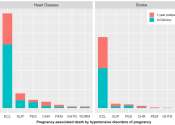Two-drug combo curbs drinking for people battling severe alcoholism
A combo of an allergy drug and a blood pressure med appears to lower daily drinking in folks battling severe alcoholism, French researchers report.
Apr 18, 2024
0
42
A combo of an allergy drug and a blood pressure med appears to lower daily drinking in folks battling severe alcoholism, French researchers report.
Apr 18, 2024
0
42

Collaborative research, led from the University of Oxford and published today in Nature Medicine, has developed a new tool called QR4 that more accurately predicts an individual's 10-year risk of cardiovascular diseases, ...
Apr 18, 2024
0
12

Quitting cigarettes during pregnancy may increase obesity-related complications for both parent and baby, but Rutgers Health researchers found that reductions in stillbirths and premature deliveries outweigh these dangers ...
Apr 17, 2024
0
0

Regina Barrett, a 69-year-old retiree who lives in this small North Carolina city southeast of Charlotte, has not been happy with her tap water for a while.
Apr 17, 2024
0
1

Keeping blood pressure under control could be crucial for women in preventing uterine fibroids, new research shows.
Apr 16, 2024
0
0

Hundreds of thousands of people worldwide are taking drugs like Ozempic to lose weight. But what do we actually know about them? The Conversation's experts explore their rise, impact and potential consequences.
Apr 16, 2024
0
0

Living in areas with shorter distances to greenspace and lower crime rates are associated with having fewer modifiable dementia risk factors, Monash University-led research has found.
Apr 15, 2024
0
2

Adult cardiovascular care centered on the patient can improve individuals' experiences and their medical outcomes, according to a new American Heart Association Scientific Statement published today in Circulation.
Apr 11, 2024
0
0

Rutgers Health researchers have found that hypertensive disorders in pregnancy are strongly associated with fatal cardiovascular disease for up to a year after birth.
Apr 11, 2024
0
1

A new Emory University study has found that adults exposed to high levels of air pollution were at an increased risk of developing Alzheimer's disease.
Apr 11, 2024
0
2

Hypertension (HTN) or high blood pressure, sometimes arterial hypertension, is a chronic medical condition in which the blood pressure in the arteries is elevated. This requires the heart to work harder than normal to circulate blood through the blood vessels. Blood pressure involves two measurements, systolic and diastolic, which depend on whether the heart muscle is contracting (systole) or relaxed (diastole) between beats. Normal blood pressure is at or below 120/80 mmHg. High blood pressure is said to be present if it is persistently at or above 140/90 mmHg.
Hypertension is classified as either primary (essential) hypertension or secondary hypertension; about 90–95% of cases are categorized as "primary hypertension" which means high blood pressure with no obvious underlying medical cause. The remaining 5–10% of cases (secondary hypertension) are caused by other conditions that affect the kidneys, arteries, heart or endocrine system.
Hypertension is a major risk factor for stroke, myocardial infarction (heart attacks), heart failure, aneurysms of the arteries (e.g. aortic aneurysm), peripheral arterial disease and is a cause of chronic kidney disease. Even moderate elevation of arterial blood pressure is associated with a shortened life expectancy. Dietary and lifestyle changes can improve blood pressure control and decrease the risk of associated health complications, although drug treatment is often necessary in patients for whom lifestyle changes prove ineffective or insufficient.
This text uses material from Wikipedia licensed under CC BY-SA